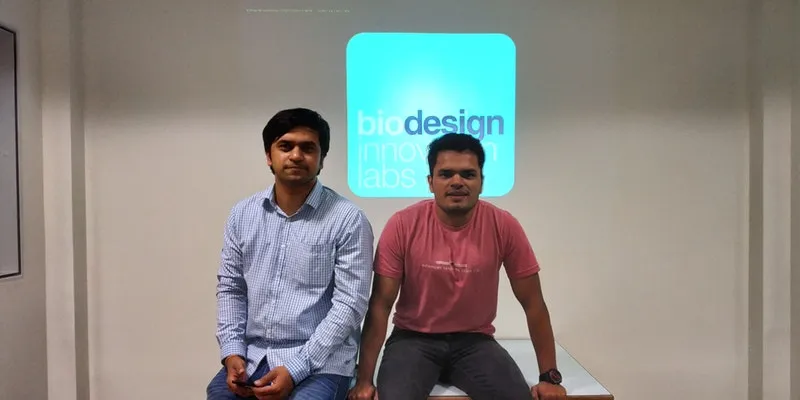Robots, wristbands, and apps: startups that innovated their products for COVID-induced med tech
As we step into the new year, YourStory lists 10 startups that innovated their products for COVID-induced med tech.
As innovation became the byword for a new normal in the wake of disruption caused by the coronavirus pandemic, this was apparent in med-tech too, which pivoted to fighting COVID-19.
From developing rapid virus testing kits and apps that prescreen for symptoms to ventilators and sanitiser-dispensing robots, here are 10 startups that innovated their products for COVID-induced med tech.
LimelightIT
Ahmedabad-based IoT startup LimelightIT’s wearable wristband monitors the body temperature of employees and takes action when it notices anyone’s temperature going up. The wristband can also detect their cough and sneeze counts.
Founded in 2018 by Tarun Purohit, LimelightIT also provides wireless ID card solutions to help organisations monitor people and assets. It offers micro-location services and automatic energy-saving solutions as well.

Tarun Purohit, Founder and CEO, LimelightIT
In the wake of the pandemic, iCreate-backed LimelightIT repurposed its ID cards into wristbands containing sensors that can detect COVID-19 symptoms. The wristband also allows employees to punch in and out without having to register their attendance biometrically.
Salcit Technologies
Hyderabad-based startup Salcit Technologies teamed up with IT company Zensark Technologies to solve the issue of pre-screening for COVID-19 symptoms.
For this, the startup repurposed its kAs mobile application, which uses artificial intelligence and audiometric technology to analyse coughing sounds. The product was updated and launched in April to prescreen people for COVID-19 infection, based on World Health Organization guidelines.

Salcit Technologies
Salcit has been using audiometric technology to detect respiratory illnesses such as chronic obstructive pulmonary disease, thus making functionalities of spirometry available anywhere, anytime. The solution was granted an Indian patent in 2019.
Invento Robotics
In April, Bengaluru-based Invento Robotics launched C-Astra, a robot that helps screen for COVID-19 symptoms and disinfects common areas. The autonomous mobile unit can move around lobbies, hallways, and rooms sanitising them.
Invento’s flagship robot, Mitra, has been upgraded with the following features: scan temperature of patients; collect necessary details such as their name, phone number, and photo; and set up video calls with the doctor for further diagnosis. Mitra was originally designed for customer engagement and would alert hosts about the arrival of visitors.

Invento Robotics, Co-founder, Balaji Vishwanathan
To reduce the risk of doctors contracting the virus, Invento made another robot called RoboDoc. It can move around a hospital autonomously and take doctors inside COVID-19 wards virtually, reducing their physical movement.
The robot also scans the temperature and other vitals of patients, and collects and feeds the data to the computer. It can carry loads of up to 2 kg.
Milagrow
In August, Milagrow HumanTech, founded by Rajeev Karwal, launched four humanoid robots: RoboDiCaprio, RoboJulia, RoboNano, and RoboElf.
Specially designed to cater to hotels, hospitals, restaurants, and corporate offices, these humanoids can interact with customers, perform tasks, and navigate independently.
Asimov Robotics
In March, Kochi-based Asimov Robotics developed two humanoid robots as part of the Kerala Startup Mission. These robots were the first in the country to raise awareness about the spread of coronavirus among people in Kerala. They stream videos and brief people about social distancing and other precautionary steps.
The robots also distribute masks, sanitisers, and napkins at the startup complex in Kochi.
Log 9 Materials
Bengaluru-headquartered nanotechnology startup offers surface sanitisation solutions through its product, CoronaOven. Its patent-pending technology uses UV-C light to disinfect surfaces of different objects.
Founded by Akshay Singhal and Kartik Hajela in 2014, Log 9 Materials is involved in designing innovative products using graphene.

Founders of Log 9 Materials
“CoronaOven is primarily a disinfectant technology,” says Akshay. “It sanitises any object that can be placed inside its chamber. It uses appropriate UV-C light intensity approved by the Indian Council of Medical Research to kill coronavirus or any other pathogen.”
FYI Health
Gautam Gambhir-backed has launched FYI Health Post, a made-in-India enterprise solution that enables facial recognition, mask detection, temperature scanning, and contactless sanitisation at the point of entry to premises.

Credit: Yash Raj Gupta, Founder, FYI Health
Launched in May 2020, the New Delhi-based health tech startup is a community health monitoring solution exclusively designed for enterprise use.
Mylab
In April 2020, Pune-based molecular diagnostics startup developed PathoDetect COVID-19 Qualitative PCR Kit for faster detection of the coronavirus infection. The kit was the first from an Indian company to receive commercial approval from the Central Drugs Standard Control Organisation.
The indigenous kit is capable of diagnosing a patient in two-and-a-half hours, unlike imported ones that take up to seven hours.
Mylab’s team of scientists was led by Minal Dakhave, who worked on the kits even in her last stage of pregnancy.
Biodesign Innovation Labs
In April, Bengaluru-based startup launched a portable ventilator, RespirAID. It is a mechanical ventilation assisting device that addresses the inconsistency, unreliability, and exhaustion caused by an Ambu bag or manual ventilation.
The device provides intermittent positive pressure ventilation and its portable size allows healthcare professionals to carry it easily during transportation and emergency situations.

Founded in 2017 by brothers Adithya Pasupuleti and Gautham Pasupuleti, Biodesign aims to provide low-cost ventilation solutions in India.
Modulus Housing
Chennai-based is solving the problem of hospital infrastructure through mediCAB, its instant and portable hospital units.
Founded in 2018 by IIT Madras alumni Shree Ram Ravichandran and Gobinath P, Modulus Housing aims to build micro infrastructures and pivoted to building portable hospital units during the pandemic.
(Edited by Lena Saha)





![[Funding alert] Bengaluru startup Invento Robotics raises undisclosed fund from MSPL Limited, others](https://images.yourstory.com/cs/2/e641e900925711e9926177f451727da9/Imageoc4z-1596548194654.jpg?fm=png&auto=format&h=100&w=100&crop=entropy&fit=crop)
![[Funding alert] Cleantech startup Log 9 Materials raises $3.5M in Series A round](https://images.yourstory.com/cs/2/bd251c602d6a11e9aa979329348d4c3e/Untitleddesign361570544803162png1571665042290png?fm=png&auto=format&h=100&w=100&crop=entropy&fit=crop)







